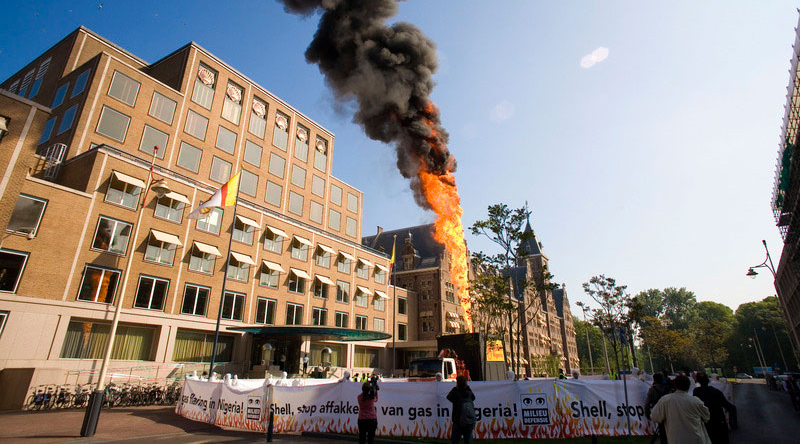Brussels/Amsterdam, 29 January 2009 – Billions of Euros made by Royal Dutch Shell should be ploughed into cleaning up the mess made by its operations around the world, Friends of the Earth urged today as the oil giant announced €21.5 billion profits for 2008. [1]
Shell has failed to significantly reduce its CO2 emissions over the last ten years [2] and causes massive damages in countries where it operates.
In Nigeria, the company is failing to respect Nigerian law after the expiration of a December 31, 2008 deadline to end harmful gas flaring. Burning is the cheapest way for Shell to deal with the gas found mixed with crude oil, but the practice costs Nigeria about 2.5 billion US dollars annually and causes acid rain which kill plants and animals and contaminates the environment. Shell oil spills in the country also pollute agricultural land depriving people of a living.
In Canada Shell processes oil sands destroying ancient forest, and in Russia its offshore operations harm the endangered Great Whales and salmon.
Friends of the Earth Europe’s extractive industries campaigner Darek Urbaniak said: “Shell makes enough profit to cover all aspects of its operations including cleaning up after itself. There is no excuse for Shell not to plough its billions of Euros of profits back into undoing some of the damage it is causing in places like Nigeria, Canada and Russia.”
Despite its sky-high profits, last year Shell received €30million of Dutch taxpayers’ money to work on the development of Carbon Capture and Storage (CCS) technology [3] – the concept of capturing carbon dioxide from the burning of fossil fuels and dumping it underground. This untried technology is yet to prove viable for addressing the issue of rising emissions and takes resources away from the development of renewable energy sources.
Friends of the Earth International Corporate campaigner Paul De Clerck said: “Shell is taking taxpayers’ money to use for unproven technology while it invests its own capital in oil sands that produce three times more emissions than conventional oil. [4] In a time of economic downturn it is ludicrous that one of the richest companies in the world can receive public money to research ways to allow it to go on polluting when it is failing to clean up the mess it has already made.”
A letter-writing campaign from Friends of the Earth International, and directed at the Nigerian President, is asking the Nigerian government to prevent oil companies from continuing to flare gas. The practice of burning excess gas is illegal in Nigeria, but Shell and other companies continue to flare gas in the country emitting as many greenhouse gases as 18 million cars, releasing toxic substances and damaging both the environment and local people. [5]
“The EU must introduce stricter environmental regulations for European oil companies to stop the practice of gas flaring,” added Darek Urbaniak.
***
[2] In 2007 Shell released 88 million tonnes of CO2; in 1998 – 92 million tonnes, Shell Sustainability Report 2007, Page 36:http://sustainabilityreport.shell.com/2007/servicepages/welcome.html [3] Het Financieele Dagblad, Jorinde Schrijven, Miljoenen voor twee projecten CO2-opslag, 28 November 2008. [4] Pembina Institute Canada, “Oil Sands Fever.”: http://www.oilsandswatch.org/pub/203 [5] http://www.foei.org/en/get-involved/take-action/stop-flaring







